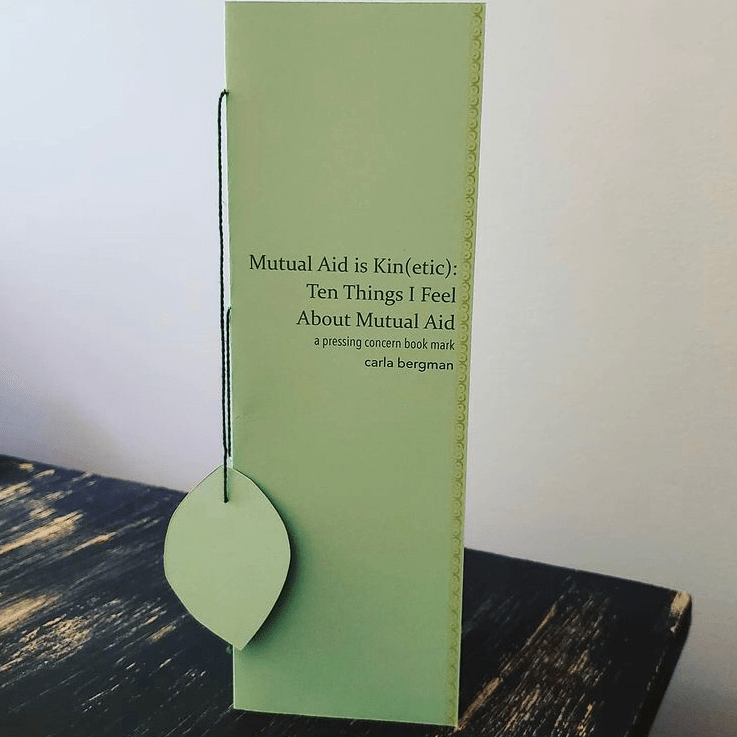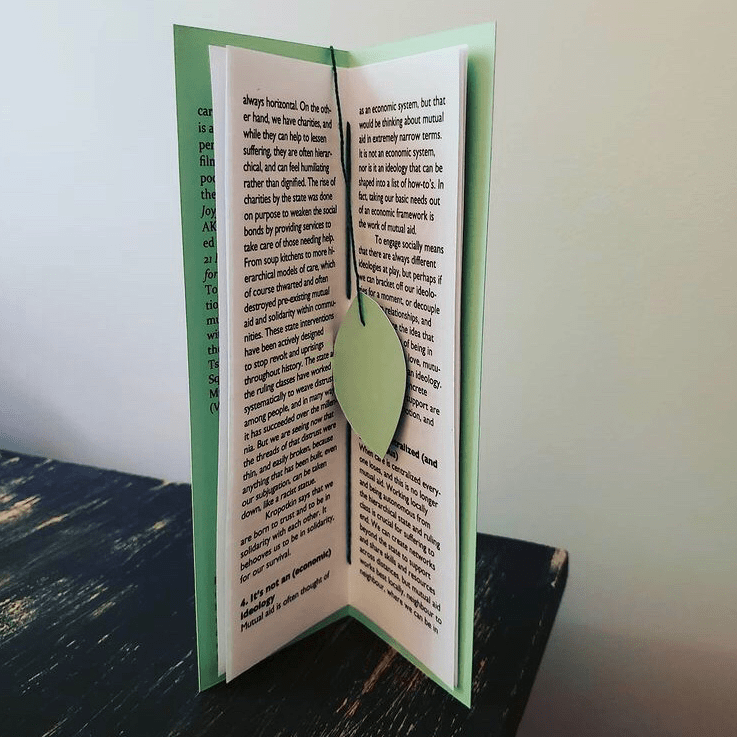Mutual Aid is Kin(etic)
ten things I feel about mutual aid
by carla bergman


this short essay was originally written for Pressing Concern Books, bookmark series in spring of 2021: pressingconcern.onlineweb.shop
images by Pressing Concern Books.
Listen to the audio recording or read the essay below.
written by carla joy bermgan ; read by carla
music by Sour Gout from the album, Endless Everyday
Mutual Aid is Kin(etic): Ten things I feel about mutual aid
“We Keep Us Safe” had to be the best four words to come out of 2020. Flowering out of this beautiful collective declaration is the idea of mutual aid.
It’s care.
It’s love.
it’s a verb.
It’s no strings attached.
Mutual aid is kin(etic).
Mutual aid is about enacting a collective web of support and care: a concrete solidarity that is rooted in dignity and justice for all. It’s about helping each other with material and emotional support, and it is at its best when no one is going without basic needs and support. It’s everything for everyone.
And…
- It’s something we do
Before Peter Kropotkin, a Russian naturalist and anarchist philosopher, wrote about mutual aid in 1902, there were societies and communities all over the planet that engaged in cooperation and mutual aid. Kropotkin’s seminal work, alongside many others, including Rebecca Solnit and Klee Benally, have shown that mutual aid is and always has been a part of our collective and ancestral memories. We don’t need to learn it, but to instead make it public, hear about it, recover it, remember it, and enact it.
Mutual aid is often highlighted most during disasters, be they hurricanes, fires, earthquakes, or a pandemic. And since the pandemic hit in March 2020, we were inundated with uplifting news about the actions of folks in their communities offering concrete care to each other: a shining lighthouse in the storm.
For the past couple decades, I have centered mutual aid in all my projects. So, when the pandemic hit, two friends and I, like many others, created a local mutual aid google doc for folks where we live to find ways to support and be supported. I was also lucky to be part of a collective book that interviewed over 100 people from around the word about mutual aid springing up as the pandemic began. The book, Pandemic Solidarity: Mutual Aid During the Covid 19 Crisis covered stories from Iraq to Taiwan to Rojava to Argentina to Turtle Island (North America). Showing that mutual aid is what we do.
- It happens all the time (beyond the crises)
Mutual aid is relational. It’s a beautiful web of cooperation, or a powerful network of care. It’s neighbour to neighbour. It’s in our homes between kin. Friendship is the other word I would use. It’s also reciprocal. But reciprocity isn’t simply a tit for tat situation. When you do something for a friend you don’t expect them to give the same care right back (do you?). Caring and providing concrete resources for someone in need is about a trust and responsibility where reciprocity is emergent. This kind of immediate trust that happens between folks is why mutual aid happens so quickly during disasters (and flows so naturally in a lot of our relationships beyond moments of suffering).
- It’s all about Solidarity
Solidarity—another word for mutual aid—is an action of concrete care, anchored in real interdependent relationships, always emergent. Many of us know that the kind of solidarity, love, and care known as mutual aid is always happening; it’s just been marginalized for the sake of profit and control by the ruling class, stereotyped as an anarchist utopian idea that happens only in hippie communes.
Solidarity is rooted in listening and trusting. It’s about love and care, and it’s always horizontal. On the other hand, we have charities, and while they can help to lessen suffering, they are often hierarchical, and can feel humiliating rather than dignified. The rise of charities by the state was done on purpose to weaken the social bonds by providing services to take care of those needing help. From soup kitchens to more hierarchical models of care, which of course thwarted and often destroyed pre-existing mutual aid and solidarity within communities. These state interventions have been actively designed to stop revolt and uprisings throughout history. The state and the ruling classes have worked systematically to weave distrust among people, and in many ways it has succeeded over the millennia. But we are seeing now that the threads of that distrust were thin, and easily broken, because anything that has been built, even our subjugation, can be taken down, like a racist statue.
Kropotkin says that we are born to trust and to be in solidarity with each other. It behooves us to be in solidarity, for our survival.
- It’s not an (economic) ideology
Mutual aid is often thought of as an economic system, but that would be thinking about mutual aid in extremely narrow terms. It is not an economic system, nor is it an ideology that can be shaped into a list of how-to’s. In fact, taking our basic needs out of an economic framework is the work of mutual aid.
To engage socially means that there are always different ideologies at play, but perhaps if we can bracket off our ideologies for a moment, or decouple them from relationships, and instead embrace the idea that these kinetic ways of being in relationships—care, love, mutual support—are not an ideology. Rather, that these concrete forms of generative support are actions, always in motion, and relational.
- It’s decentralized (and autonomous)
When care is centralized everyone loses, and this is no longer mutual aid. Working locally and being autonomous from the hierarchical state and ruling class is crucial for suffering to end. We can create networks beyond the state to support and share skills and resources across distances, but mutual aid works best locally, neighbour to neighbour, where we can be in relationships with each other. Mutual aid thus remains autonomous in that we can’t enforce this on anyone, there can’t be a rule book for social relationships, and that includes mutual aid — it has to be emergent, it has to be consensual.
- Ya’ll don’t have to be a radical to do it
Fun fact: everything I know about mutual aid—taking care of your neighbors and sharing resources—I learned growing up on a military base, a place where anarchist ideas like antiauthoritarianism and autonomy were seen as dysteleologic. But the thing is, the soldier ethos of “leave no one behind” played out in this beautiful care-centered way at home, in the community.
- There’s no secret handshake
I realize I am pushing the point here that mutual aid is what us humans (and plants and other animals, and fungi) just do. But really, there’s no club. You can’t be better than another person at it. You can’t be the BEST MUTUAL AIDER EVER. It’s just what we do. But we can amplify our stories to bolster the awareness of the practice.
- We have a lot of work to do
Alongside the state’s attempts to weaken our social bonds, mutual aid is often truncated because we are stretched thin surviving capitalism. As many of us have to continue to make individual and family choices about shelter and food, etc., we remain in this loop of trying to limit suffering for others, while surviving ourselves. Alongside growing webs of care and solidarity, and amplifying that there has been an increase in selfless acts of care, we must also do the work to crush capitalism as it prevents our collective ability to deepen our care for one another.
- Mutual aid is worth growing
We must continue to work together to keep nurturing mutual aid in our relationships and communities. Because creating intergenerational webs of intimacy and support is a radical act in a world that has privatized so much of our lives. These growing relationships that are built on care and love can be transformative and begin to undo the ruling classes violent hold on us. And, in doing so, we can save the planet.
We also have to be careful about capitalists’ ability to co-opt -our movements. I’d like to think that you can’t virtue signal mutual aid. But I won’t be surprised if profiteers eventually create a “Mutual Aid Day”– kind of in the spirit of Valentine’s: a place where genuine care between individuals is commodified and sold back to us. Let’s not make that happen.
- Another end of the world is possible
With capitalism continuing to tear apart communities, as profit-driven extraction continues to rupture the planet and the more-than-human animals, fungi, and plants, this conversation about how we socially choose to share resources, and to politically organize is vital. Ending capitalism, white supremacy, colonialism and the rest of the horrors must happen if we are going to have a viable and thriving future for the planet and all the ecologies that inhabit it.
We are entangled. Mutual aid is kinetic. It’s not just a tool folks grab from their utility belt during disasters. It’s who we are. every day. everywhere. all the time.
Normalize it.
*
I was asked to suggest 13 book s to pair the book mark with (there are many more!)
- Mutual Aid: A Factor of Evolution , Peter Kropotkin
- A Paradise Built in Hell, Rebecca Solnit
- As We Have Always Done: Indigenous Freedom through Radical Resistance, Leanne Betasamosake Simpson
- Pandemic Solidarity: Mutual Aid during the Covid-19 Crisis, Marina Sitrin, Colectiva Sembrar • Braiding Sweetgrass: Indigenous Wisdom, Scientific Knowledge and the Teachings of Plants, Robin Wall Kimmerer
- The Dispossessed, Ursula K. Le Guin
- The Revolution Will Not Be Funded: Beyond the Non-Profit Industrial Complex, ed. INCITE! Women of Color Against Violence
- Staying with the Trouble: Making Kin in the Chthulucene, Donna Haraway
- All About Love: bell hooks
- Mutual Aid: Building Solidarity During This Crisis (and the Next), Dean Spade
- Black Flags and Windmills: Hope, Anarchy, and the Common Ground Collective, scott crow
- Entangled: How Fungi Make Our Worlds, Change Our Minds & Shape Our Futures, Merlin Sheldrake
- Mushishi Book Series, Urushibara Yuki (蟲師, 漆原 友紀)